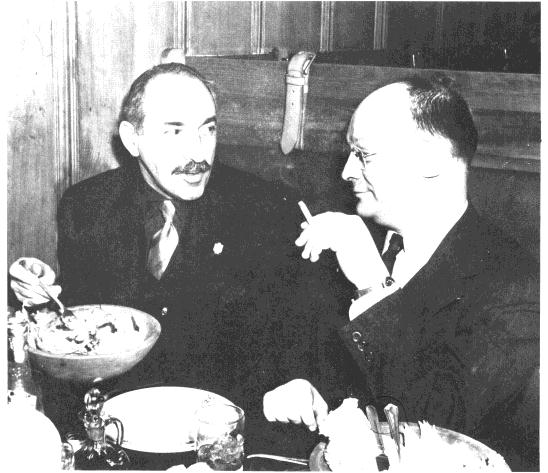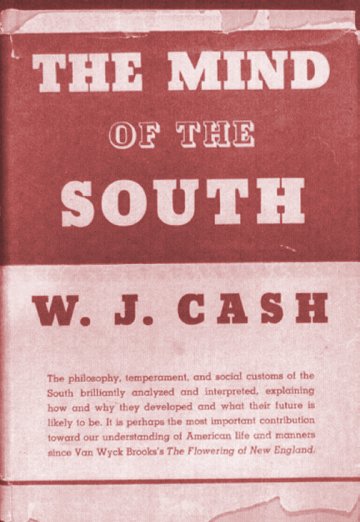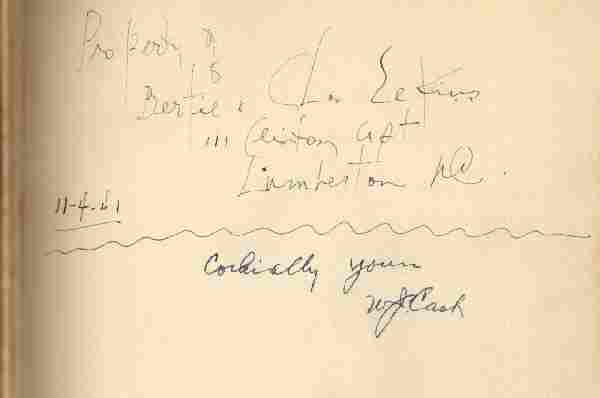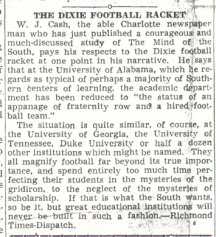Publication, Review, Mexico City
{Page 1 of 3--Publication & Review}
Go
to Quick Navigation Bars at Bottom of Page for Other
Sections of Site |
This photograph, taken by Alfred Knopf in 1939, is one of only two showing a smiling W. J. Cash. Prior to Mr. Knopf's death, the photograph graced the cover and frontispiece of W.J. Cash: Southern Prophet, by Joseph L. Morrison (Knopf, 1967).

Cash and Alfred Knopf at the Hotel Charlotte, February 18, 1941, discussing the publication of the book, its publicity and the planned novel by Cash. Cash was an incessant smoker but this is the only photograph which bears proof of the fact.
Charlotte News
February 19, 1941
Publisher Knopf Is
Proud Of Cash Book
Expects, and Hopes, too, That New Book Will Arouse Some Controversy
By PETE McKNIGHT
Charlotte News Staff Writer
W. J. Cash better get out his shootin' irons next time he goes to Nashville. For the Southern Agrarians who center their activities there are "laying for him." His book is "monstrous," they assert.
Such was the comment of Alfred A. Knopf, the man who gave Cash the original idea for "The Mind of the South, " who suffered through the long years of the book's preparation, and who finally published it "because it was a great contribution to America's literary efforts."
And Mr. Knopf should know about Nashville, for he's just come from there, having spent two days trying to convince fellows like Richmond Beatty and Donald Davidson, Vanderbilt University professors and leaders of the Agrarian school of thought, that he and Cash really are good friends of theirs.
DOESN'T MIND CRITICS
"We've found the first outburst of opposition to the Cash book there. There'll be others, we hope (with a sly smile which thinned and curled the heavy mustache). You can see that very easily--the more comment, the wider the sale of the book. Nothing so encourages book sales like controversy."
Mr. Knopf sat over orange juice and coffee at the Hotel Charlotte tavern this morning and mused about the South. This is the first place I've found where the waitress will bring me a pot of coffee when you order it. Everywhere else in the South they bring you a cup."
Also--"Southerners usually think that us Yankees won't publish a book about the South unless it's critical. They're wrong."
Also--"I've found the most militant war spirit in the South. Really, I'm amazed.
Mr. Knopf wondered about Bob Reynolds and his speech before the Senate yesterday, couldn't understand how folks in North Carolina were supporting the man.
. . But always it went back to Cash. Mr. Knopf is very fond of The News' associate editor, believes he has a great literary future ahead. But on the question of novel-writing, he was noncommittal.
"It's not up to us to say whether Cash can or can not write a novel. You might draw this parallel--one man might paint a beautiful picture of: an imposing bridge which is a perfect reproduction, but that man might not be able to build the bridge."
CASH'S DECISION
"It's up to Cash. He knows himself better than anyone else. And the best way for him to find out whether he can write novels or not is to try. If he can, swell. Nothing will be better news for us."
The New York publisher admitted very frankly that his interest in the book was more than commercial. "When I first saw the manuscript, I knew nothing else like it had ever been done. That's why we published it without any indications that it would be a money maker."
But as a matter of fact, he added, the book is selling extremely well, above their expectations. And it will continue to do so through the coming years, Mr. Knopf believes. "It's a great book in every respect. We're proud to be the publishers."
Charlotte News
February 19, 1941
Cash's Book Best Seller
"The Mind of the South," by W. J. Cash, associate editor of The News, entered the list of national best sellers during the first month of its publication.
This was revealed by the monthly report for February compiled by Publishers' Weekly of New York City. Mr. Cash's book was published on Feb. l0 by Alfred A. Knopf.
The report for February, which appeared today, showed that``The Mind of the South".followed "Days of Our Years" by Pierre Van Paassen on the list of national best-sellers.
It was reported as a best seller in Chicago, Ill, Charlotte, Atlanta, Ga., and Lynchburg, Va.
Best sellers for the week of February 17, 1941 included The Mind of the South in Atlanta, where the book remained a best seller for several weeks, but not enough to earn for Cash very much in the way of royalties. All toll, he received less than a thousand dollars during his lifetime from the book. Since 1941, the book has sold something in the neighborhood of 200,000 copies, and has never been out of print, having been reprinted in fresh paperback editions in 1954, 1960, 1969, and 1991. (Note above the presence of Delilah, by Marcus Goodrich, as a best seller in New York, Boston, Chicago, Philadelphia, and Washington. This is the book about life on board a destroyer in the months immediately preceding the U.S. entry into World War I, to which Cash mysteriously alludes circuitously bringing his subject to Texas, then the South, at the beginning of the University of Texas Commencement Address on June 2. Five years after Delilah's publication, after distinguished service in the Pacific in World War II, Goodrich, a graduate of Columbia, wrote the treatment for the screenplay for "It's A Wonderful Life" and married Olivia DeHavilland. He was bitterly divorced from her in 1951 and lived the remainder of his life as a recluse in Richmond where he died in the old Confederate Convalescent Hospital in October, 1991. He never published another book after Delilah, though he "wrote constantly" and had at least three unpublished manuscripts, including a second half of Delilah by the mid-Sixties.) (Also note the presence of The Wave of the Future, by Anne Morrow Lindbergh, on the list in Chicago. Cash bitterly attacked the Lindberghs in his last editorials for The News. Stopping short of calling them quislings, he nevertheless stated plainly their apparent hatred of Great Britain and support of the Nazis. He further obliquely referenced the Lindberghs in this regard at the beginning of the Texas commencement address.)
Letter from Knopf editor James Russell to Cash in January outlining early praise for book and suggestions for post-publication publicity. (Note the quite accurate prediction that Cash would shortly get the opportunity "to defend [his] remarks about GWTW to Miss Mitchell".)
Advertisement for the book with initial review excerpts which ran in trade publications and newspapers. The note at top is an unknown hand and says, "Mr. Knopf As inserted", presumably meaning that Alfred Knopf had approved the ad.

Original dust jacket of first edition
Dedication page of first edition

Signed first edition owned by Cash's sister and brother-in-law. This particular volume was presented posthumously in November, 1941, explaining the lack of a more personal salutation by Cash to his beloved sister at whose wedding in June, 1939 "he cried like a baby". Cash's family assumed that there would be plenty of opportunity to receive an autographed copy after his return from Mexico.
Last page of the first edition of The Mind of the South showing particular typeface used, a noted trademark to this day of the Knopf Publishing Company.
Cash's friend and Mary's cousin, Cam Shipp, sent along this humorous card referring to his own early review of the book which appeared in the News on publication day. By this time, Shipp had quit the News and become a Hollywood publicity agent for Warner Brothers as evidenced by the below letter mailed to Mary a month earlier. (The film to which he refers with Bette Davis and James Cagney was "The Bride Came C.O.D.")

Cam Shipp's review; high praise.


Note and brief piece sent along by Virginius Dabney, well-known editor of the time of the Richmond Times-Dispatch. Dabney had greatly offended Cash a couple of weeks earlier by stating in his review of the book that the first half of the book was slow moving. Cash took offense primarily because Dabney had written to him in the fall requesting to be allowed to be one of the first to review it. Cash had also given praise to Dabney for his courageous editorial stands in support of the 1938 federal anti-lynching legislation and against the poll tax. (Mind of the South, pp. 339, 373) Cash dashed off an angry letter to Dabney immediately followed by an humble and embarrassed apology over the first tirade. Dabney responded with an "incident forgotten" letter, followed by this friendly offering. The note above reads: "Dear Cash- This much of an editorial has been republished in about six Va. newspapers and in full in a couple. I saw it a few days ago, in full, in the Chattanooga Times. Hope the book is going well. V. Dabney"

Generic review of the book by Associated Press reporter John Selby which appeared in dozens of papers throughout the country. Mary subscribed to a clipping service which duly supplied a couple of dozen copies of this same review, each with a little pink tab appended indicating the paper where it appeared.
John Temple Graves II, another recipient of an honorable mention by Cash (Mind of South, p. 374), wrote these two pieces below for the Roanoke Times, the piece on the left appearing April 12 and the piece on the right appearing March 15, and then sent them to Cash with the above inscription. His only beef with Cash appeared to be Cash's mention of Graves's father in the book as having been responsible for the 1906 Atlanta race riot resulting from the printing of inflaming editorials in the Atlanta Constitution regarding supposed attacks on white women by black men. Not so said the younger Graves; as chief editor of the paper, his father was not responsible for its editorial content. He shifted the blame for Cash's putative error, however, to the New York Sun, the "originator of the story" at the time. (Cash had attributed the story to Virginius Dabney. (Mind of South, p. 301)) The April 12 piece by Graves is poignant as it announces in print Cash's Guggenheim Fellowship and his intent to travel to Mexico for a year; it begins with the lines from Alan Seeger, the World War I soldier's lament, (said to be one of John F. Kennedy's favorite poems), "I have a rendezvous with Death..."